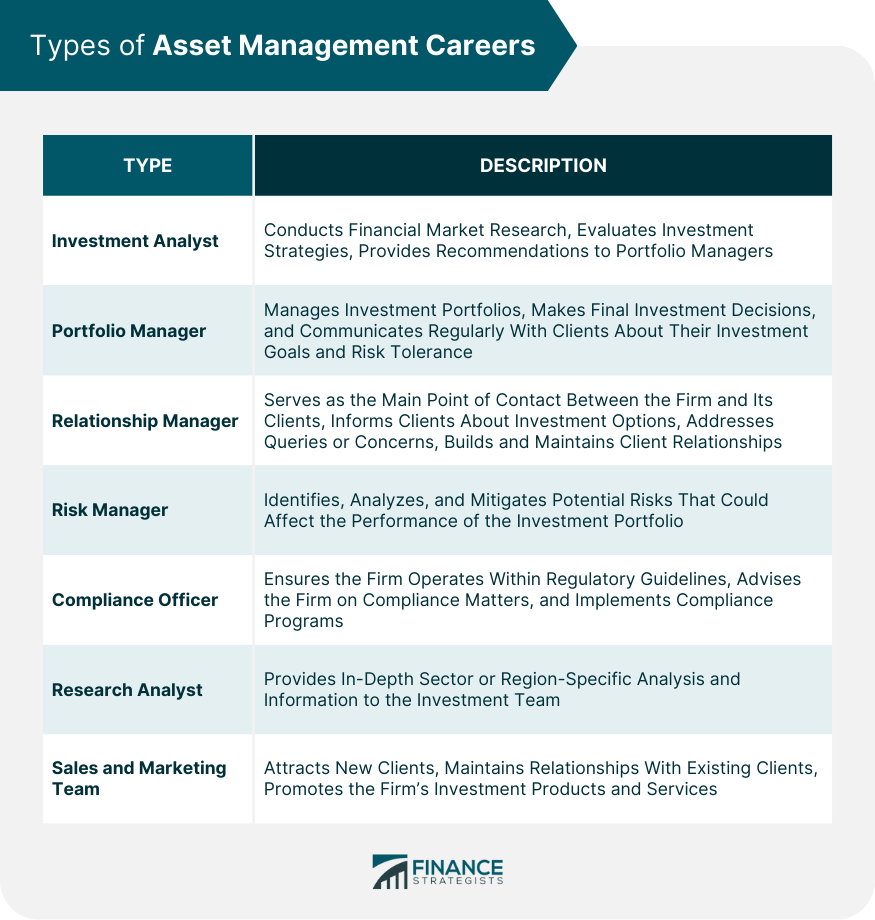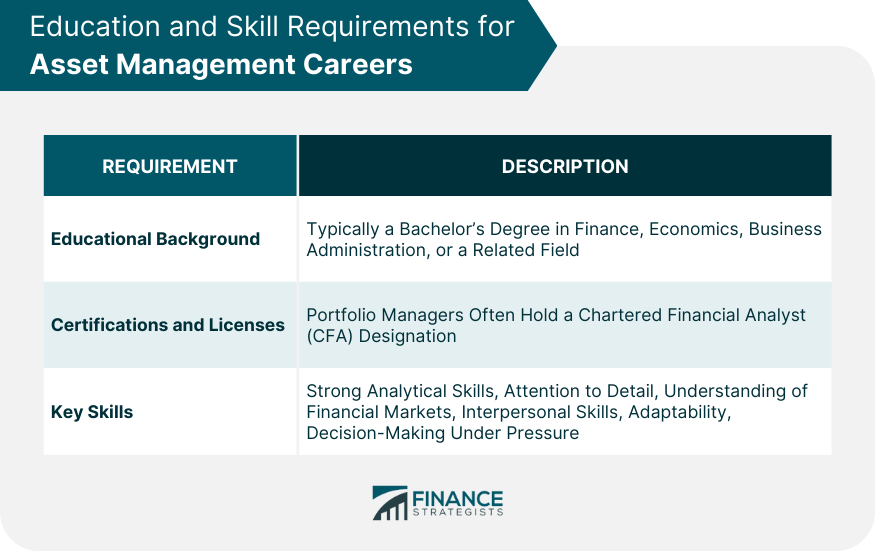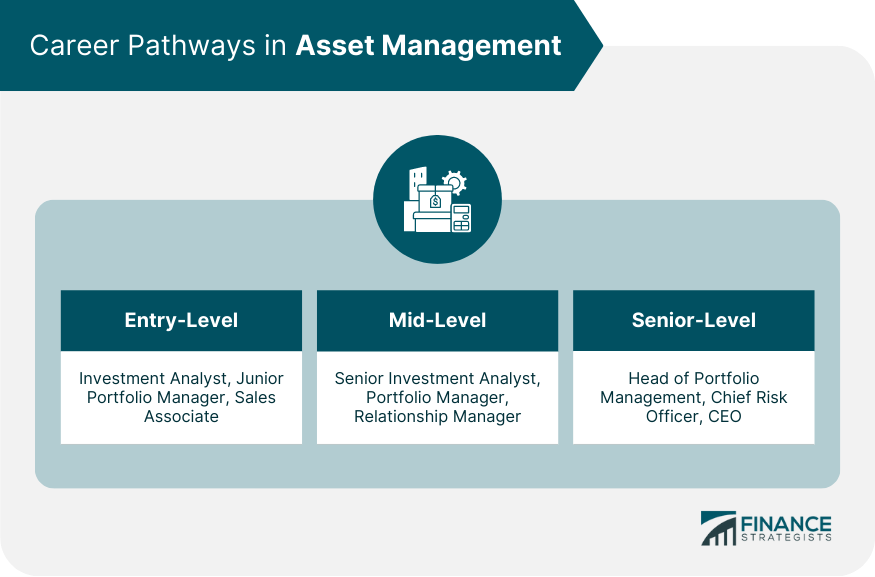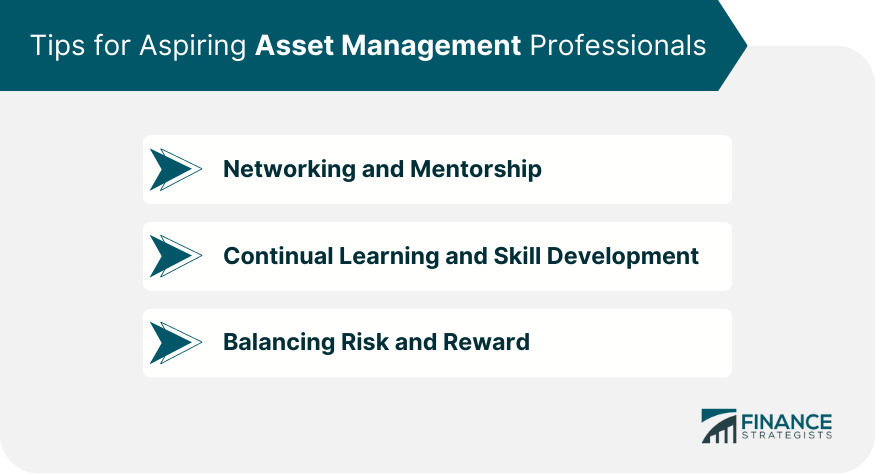Asset management careers span a wide range of roles, from investment analysts and portfolio managers to compliance officers and sales associates. These professionals work with individual or institutional investors to manage their assets, aiming to maximize returns and minimize risks. They typically have a strong background in finance, economics, or business administration. Some roles require specific certifications, like the Chartered Financial Analyst (CFA) designation. As with many financial careers, those in asset management face high-stress situations due to market volatility and must stay abreast of financial regulations and market trends. Technological advancements are also influencing the industry, with AI and data analytics playing an increasingly important role. Despite the challenges, asset management careers can be rewarding, offering the opportunity to make a significant impact on clients' financial goals. An Investment Analyst in the asset management industry primarily conducts extensive research on the financial market, evaluates investment strategies, and provides recommendations to Portfolio Managers. Their role is often the backbone of the decision-making process. The responsibility of an Investment Analyst is not only to identify lucrative investment opportunities but also to gauge the associated risks. The Portfolio Manager stands as a key player in the asset management career field. Their role entails managing investment portfolios, making final investment decisions, and regularly communicating with clients to understand their investment goals and risk tolerance. They use insights from Investment Analysts and their knowledge to construct diversified portfolios that align with the client's objectives. In asset management, Relationship Managers are the main point of contact between the firm and its clients. They work closely with clients to understand their financial objectives, inform them about various investment options, and address any queries or concerns they might have. Moreover, they help in building and maintaining strong client relationships, which is crucial for the growth of the asset management firm. The role of a Risk Manager is of paramount importance in asset management. They are tasked with identifying, analyzing, and mitigating potential risks that could adversely affect the performance of the investment portfolio. Risk Managers often use advanced statistical models and collaborate closely with Portfolio Managers to manage risk levels in line with the firm's risk tolerance. Compliance Officers ensure that an asset management firm operates within the regulatory guidelines set by the government and financial authorities. They are responsible for understanding complex financial regulations, advising the firm on compliance matters, and implementing compliance programs to mitigate legal and regulatory risks. Research Analysts in the asset management industry are focused on a specific sector or region, providing in-depth analysis and information to the investment team. They follow market trends, analyze financial data, and write reports to assist in making informed investment decisions. The Sales and Marketing team in an asset management firm plays a crucial role in attracting new clients and maintaining relationships with existing ones. They are responsible for promoting the firm's investment products and services, developing marketing strategies, and communicating the firm's value proposition to potential clients. A career in asset management typically requires a bachelor's degree in finance, economics, business administration, or a related field. However, due to the competitive nature of the industry, many professionals also hold advanced degrees such as a Master's in Business Administration (MBA) or a Master's in Finance. Certain roles in asset management may require specific certifications or licenses. For instance, Portfolio Managers often hold a Chartered Financial Analyst (CFA) designation, which is widely recognized in the financial industry. Meanwhile, Compliance Officers may need a Certified Regulatory Compliance Manager (CRCM) certification. Successful professionals in the asset management industry often exhibit strong analytical skills, attention to detail, and an understanding of financial markets and investment principles. In addition, interpersonal skills are crucial due to the client-facing nature of many roles. Professionals should also be adaptable and capable of making sound decisions under pressure. Entry-level roles in asset management include positions such as Investment Analysts, Junior Portfolio Managers, and Sales Associates. These roles provide a solid foundation for understanding the dynamics of the financial market and investment strategies. After gaining some experience in the field, professionals may move on to mid-level roles such as Senior Investment Analyst, Portfolio Manager, and Relationship Manager. These roles involve more responsibility and require a deeper understanding of the market and client relationship management. Senior-level roles in asset management, such as Head of Portfolio Management, Chief Risk Officer, or even Chief Executive Officer (CEO), involve strategic decision-making and oversight of the firm's overall operation. Networking and finding a mentor can be extremely beneficial for those aspiring to build a career in asset management. It can provide opportunities for learning, skill development, and career advancement. Continual learning and skill development are crucial for success in asset management. This could involve pursuing advanced degrees, obtaining professional certifications, or staying up-to-date with financial markets and trends. Balancing risk and reward is a critical aspect of any asset management career. It involves making strategic decisions that aim to maximize returns while minimizing risk for clients. Asset management careers are expansive and dynamic, offering diverse roles such as Investment Analysts, Portfolio Managers, and Compliance Officers. The field requires a solid educational background, with many professionals holding advanced degrees and relevant certifications. The skillsets required include strong analytical abilities, an understanding of financial markets, and excellent interpersonal skills. Entry-level positions offer a solid foundation, and with experience, professionals can advance to mid-level and senior roles. The landscape of asset management is being reshaped by technological innovations, regulatory changes, and shifting market trends. Aspiring professionals are encouraged to leverage networking and mentorship opportunities and engage in continual learning and skill development. The ultimate aim of these careers is to create a balance between risk and reward to achieve clients' financial goals. Thus, a career in asset management can be rewarding but requires a commitment to continual learning and adaptability to market changes.Asset Management Careers Overview
Types of Asset Management Careers
Investment Analyst
Portfolio Manager
Relationship Manager
Risk Manager
Compliance Officer
Research Analyst
Sales and Marketing

Education and Skill Requirements for Asset Management Careers
Necessary Educational Background
Required Certifications and Licenses
Key Skills for Success in Asset Management Careers

Career Pathways in Asset Management
Entry-Level Positions
Mid-Level Positions
Senior-Level Positions

Tips for Aspiring Asset Management Professionals
Networking and Mentorship in Asset Management
Continual Learning and Skill Development
Balancing Risk and Reward in Asset Management Careers

Conclusion
Asset Management Careers FAQs
A bachelor's degree in finance, economics, business administration, or a related field is usually required for entry-level positions in asset management. However, advanced degrees like a Master's in Business Administration (MBA) or a Master's in Finance can be beneficial for career progression.
Certain roles in asset management may require professional certifications. For instance, a Chartered Financial Analyst (CFA) designation is highly respected and often sought after in the industry, especially for Portfolio Managers. Compliance Officers, on the other hand, may benefit from a Certified Regulatory Compliance Manager (CRCM) certification.
Entry-level roles in asset management include positions such as Investment Analyst, Junior Portfolio Manager, and Sales Associate. These roles offer a foundation for understanding the dynamics of the financial market and investment strategies.
Professionals in asset management often deal with high-stress situations due to market volatility and the high-stakes nature of investment decisions. They also need to constantly keep up with changes in financial regulations and market trends.
Technology is significantly impacting asset management careers. Innovations in AI, machine learning, and data analytics are enabling asset management professionals to make more informed investment decisions, improve operational efficiency, and provide more personalized services to clients.
True Tamplin is a published author, public speaker, CEO of UpDigital, and founder of Finance Strategists.
True is a Certified Educator in Personal Finance (CEPF®), author of The Handy Financial Ratios Guide, a member of the Society for Advancing Business Editing and Writing, contributes to his financial education site, Finance Strategists, and has spoken to various financial communities such as the CFA Institute, as well as university students like his Alma mater, Biola University, where he received a bachelor of science in business and data analytics.
To learn more about True, visit his personal website or view his author profiles on Amazon, Nasdaq and Forbes.















